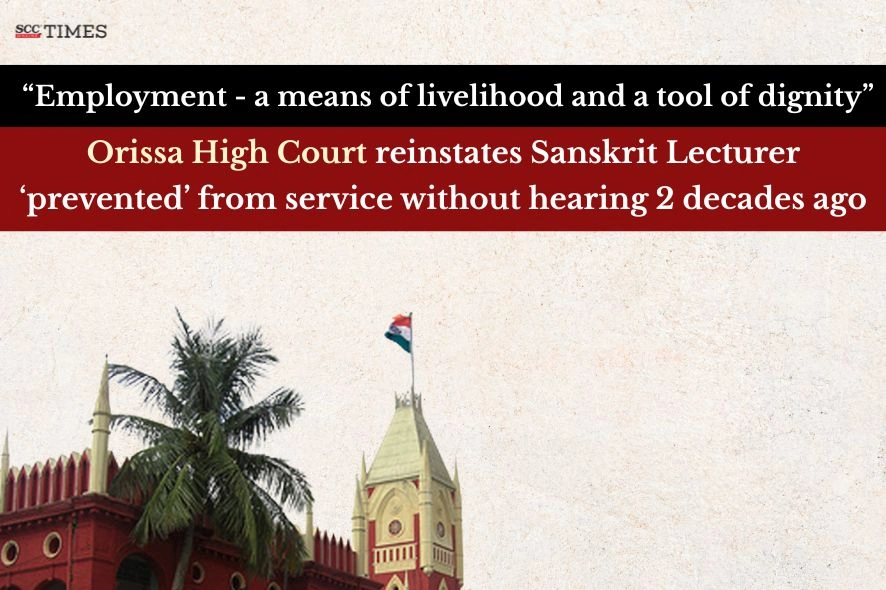Orissa High Court: While hearing a writ petition under Articles 226 and 227 of the Constitution, wherein the petitioner, a Lecturer in Sanskrit Vyakarana appointed on 15-04-1998, challenged the Director’s order dated 28-07-2023 favouring Respondent 5’s appointment despite her earlier appeal having been allowed, a Single Judge Bench of Dixit Krishna Shripad, J., held that employment is both a means of livelihood and a tool of dignity, and depriving a duly appointed employee of her job without affording reasonable opportunity of hearing is grossly violative of the principles of natural justice. Clarifying further, the Court observed that while respondent may be accommodated elsewhere, her appointment cannot override the petitioner’s right to reinstatement.
Background:
The petitioner was appointed as a Lecturer in Sanskrit Vyakarana on 15-04-1998. From 16-03-2004, she was prevented from performing her duties. She filed an appeal before the Director, which remained pending until 2010, when the Court directed the Director to consider it. On 19-07-2018, the Director allowed her appeal and instructed that she be permitted to rejoin duty. She reported for duty the next day.
Meanwhile, Respondent 5 challenged the Director’s order, while the petitioner sought its implementation. Both petitions were heard together, and, in July 2022, the Court remitted the matter for fresh consideration. On 28-07-2023, the Director rejected the petitioner’s claim and favoured Respondent 5, directing the Governing Body to approve Respondent 5’s appointment. The petitioner, aggrieved, filed the present petition.
The petitioner argued that she never abandoned her job, especially in difficult times of employment. Her appointment was ratified in 1998, and she was forcibly prevented from working in 2004, which amounted to removal from service. She pointed out that her appeal was allowed in 2018, she rejoined duty, but the Director later unjustifiably favoured Respondent 5. She further claimed that Respondent 5 was appointed to another post even before the alleged vacancy from her termination, and that no call notice was ever served on her, making the action violative of natural justice.
The respondents, however, argued that the petitioner did not file a proper appeal under the Government Circular, making the Director’s finding valid. They contended that Respondent 5 was rightly appointed to the vacancy created by the petitioner’s absence, and that her unauthorised absence justified termination. They maintained that since the petitioner abandoned her job and failed to respond to the call notice, her termination and Respondent 5’s appointment could not be faulted, particularly after the authorities examined all aspects before rejecting her claim.
Analysis and Decision:
The Court emphasised that the petitioner’s contention of being prevented from discharging her duties, which eventually amounted to removal from service, stood substantially established. The Court noted that for filing an appeal, there need not be a positive order of removal, and that unlawfully preventing an employee from performing duties amounts to removal.
The Court observed that no explanation was offered by the other side as to why a person, duly selected through open competition, appointed on 15-04-1998, and having rendered about 14 years of spotless service, would suddenly abandon employment. The Court highlighted that in the hard days of unemployment, more particularly for women, there had to be a strong case made out that the employee abandoned the job.
The Court further observed that the contention of Respondent 5, that the petitioner ought to have returned to duty upon issuance of a call notice, was liable to be rejected. The Court noted that the alleged notice dated 20-10-2003 was not shown to have been served on the petitioner, nor was there any proof of service placed on record. The Court emphasised that abandonment of service cannot be readily inferred, especially when service of the call notice is not substantiated. The Court warned that accepting such arguments would imperil employees by leaving them vulnerable to unscrupulous employers.
The Court consequently held that once abandonment of employment was not substantiated, the matter fell within the realm of principles of natural justice, which form part of Article 14 of the Constitution. The Court emphasised that employment is both a means of livelihood and a tool of dignity and depriving a duly appointed employee of her job without affording reasonable opportunity of hearing is grossly violative of these principles.
The Court emphasised that any appointment made to a vacancy created by removal of an incumbent is always subject to the outcome of the challenge to such removal, invoking the doctrine of lis pendens under Section 52 of the Transfer of Property Act, 1882. The Court clarified that while Respondent 5 may be accommodated elsewhere, her appointment cannot override the petitioner’s right to reinstatement.
Consequently, the Court, while allowing the petition, quashed the order and directed reinstatement of the petitioner forthwith, or within eight weeks at the latest, with continuity of service but without back wages. The Court further ordered the Managing Body to pay costs of Rs 20,000 to the petitioner within eight weeks, failing which an additional Rs 100 per day would be imposed for delay.
[Tapaswini Pattnaik v. State of Orissa, 2025 SCC OnLine Ori 3996, decided on 13-11-2025]
Advocates who appeared in this case:
For the Petitioner: S.K. Mishra and B.P. Pradhan, Advocates
For the Respondent: S.B. Mohanty, Addl. Government Advocate



